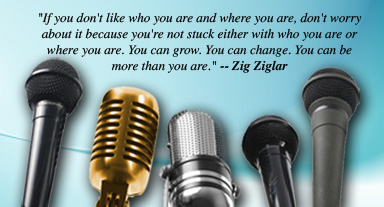What’s one of the simplest, most effective ways of getting yourself known as a professional speaker? Networking. It makes sense, doesn’t it? The more people you meet, the more people you know. The more people you know, the greater the potential for further connections.
Here are three easy ways to get out there and get networking.
Tip No. 1: Put yourself out there.
The best thing you can do to make your presence as a professional speaker known is to do just that – make your presence known. If you want people to be talking about you and recommending you as a public speaker, they have to know who you are first.
So attend lots of events. Attend events specifically related to professional speaking and networking, but also attend any other events you hear about and are interested in, from book readings to learning workshops, from gallery openings to food festivals. When you’re at those events, be social. Talk to everyone you can and try to make connections. And make sure that everyone you speak with knows your name, knows your message and knows you’re a professional speaker. You never know who you might meet – and who they might know!
You may also want to consider joining a speakers network, whether it’s a local speaking group or a national organization such as the National Speakers Association or the Canadian Association of Professional Speakers. CAPS, for instance, strives to make its members more successful in their speaking businesses. “If you’re speaking for a living now, membership in CAPS will connect you to the speaking community internationally, provide you access to the latest industry practices and link you to experts and suppliers in virtually every field imaginable. You’ll benefit from being plugged into the pulse of the industry worldwide,” says the CAPS website.
“If you’re currently speaking as part of your job and are considering a full-time career as a professional speaker, there is no better place to be. We provide programs, information and access to fellow experts on a regular and local basis anywhere in Canada,” it continues.
Put yourself out there on the Internet, too. Read and comment on other peoples’ blogs. Respond to other peoples’ tweets. If you be yourself and take a genuine interest in others, you’re sure to make new connections in no time.
Tip No. 2: Mingle! And talk to strangers.
After you’ve given a presentation, stay behind to speak with any audience members who might have further questions. Sometimes people have questions they’d like to ask one on one instead of in front of the entire crowd. This is a great opportunity to forge deeper connections with those people – the people who most likely connected with your message. (And don’t forget this is a great opportunity to ask for feedback!) By answering questions in person and getting to know your listeners, you’ll earn the respect of both the audience and the event organizers. Recommendations from people who have seen you speak are great. But recommendations from people who have seen you speak – and who have had the opportunity to connect with you in conversation – are even better.
Sure, meeting and connecting with people at networking events, speaking events and conferences may be the natural way to start making connections. But you never know where – or when – you might meet someone who could prove to be a valuable contact. So turn your entire life into a networking event by taking an interest in all of the people around you.
Talk to people at the events you’re attending socially, such as parties and weddings. Talk to the person sitting next to you while you’re waiting to board an airplane, train or bus. And talk to the person sitting next to you on that airplane, train or bus. Talk to the lady in the line behind you at the grocery store or the guy in the line in front of you at your local coffee shop. Don’t talk about yourself – at least not at first. Instead, find some common ground. Ask about their interests, about what they do. If you take a genuine interest in the people around you and what they have to say, chances are that they, in turn, will take an interest in you and in what you do.
Tip No. 3: Follow up.
Stay in touch with the connections you make. And follow up with them about what you spoke about. For instance, if somebody you spoke with at a conference mentioned to you they were presenting at an event next month, the next time you see them remember to ask them how it went. Better yet, instead of waiting until you see them, shoot them an email. They’ll appreciate that you remembered and that you were thinking about them – and that will get them thinking about you.
Or, if you’re chatting with someone who tells you they’re going on vacation somewhere you’ve travelled to yourself, offer to send them some recommendations of restaurants to try or sights to see – and then follow through. Thoughtfulness and attention to detail mean a lot to people. And sometimes an endorsement as simple as – “That Joe sure is a nice guy, listen to what he did for me!” – can really pay off in the long run.
Implement these three strategies and you’ll find yourself networking – and making lifelong connections – in no time. Be sure to share your networking strategies with us here or on our Facebook page. To your speaking success!


